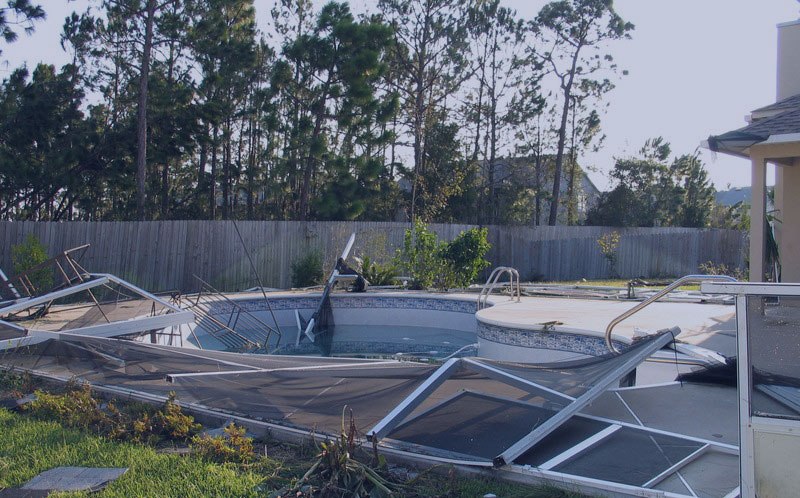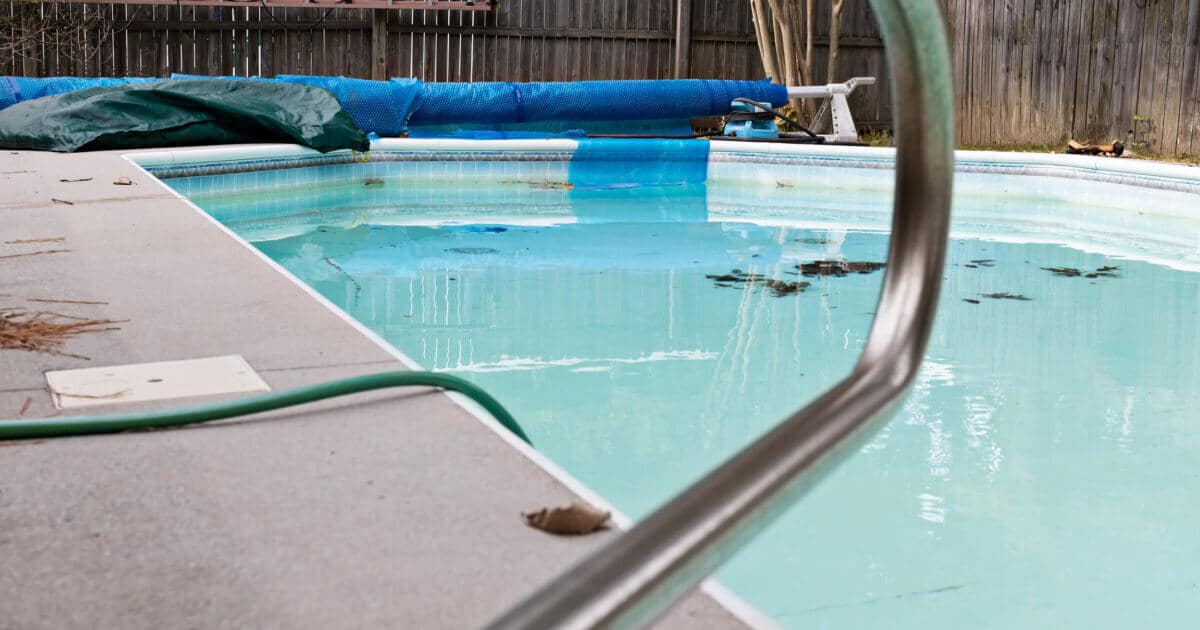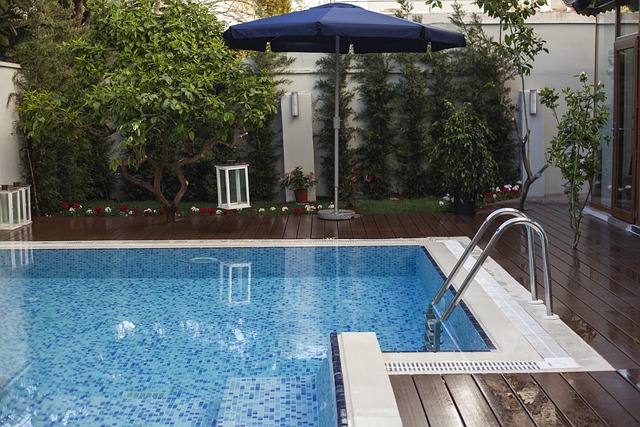As hurricane season approaches, pool owners must prioritize their pool’s safety along with their home. While safeguarding your property is crucial, ignoring hurricane pool preparation can lead to significant damage. A few simple steps can help protect both the pool and the surrounding area from strong winds, heavy rain, and debris. This guide will walk you through essential tips on how to protect your pool from a hurricane and ensure that your pool remains safe.
Don’t Drain Your Pool!
A common mistake in pool hurricane protection is draining the pool before the storm hits. Many people think this will prevent overflow or flooding, but it can actually cause structural damage to the pool.
– Why Not Drain? The weight of the water holds the pool in place, especially during heavy rains. Draining it increases the risk of the pool “popping” out of the ground due to pressure from rising groundwater. Always leave water in the pool as part of your hurricane pool preparation strategy.
– Ideal Water Level: You can lower the water level by one or two feet to accommodate rainwater, but never fully drain the pool. This also helps prevent debris from flying around.

Secure Pool Equipment During a Hurricane
Your pool’s equipment—such as pumps, filters, and heaters—are highly vulnerable to damage during storms. Securing them properly can save you costly repairs.
– Turn Off the Power: Shut off the circuit breakers for all pool equipment to avoid electrical damage caused by power surges or flooding.
– Store or Cover Equipment: If possible, move portable equipment indoors. For larger equipment like filters or heaters, cover them with a waterproof tarp and secure it tightly. This step is crucial in pool maintenance before a hurricane.
– Remove Automated Cleaners: If you have a robotic cleaner or other automated equipment in the pool, remove them and store them indoors to prevent damage.
Protect Pool Accessories
Loose objects around the pool area can turn into dangerous projectiles during a storm. Proper hurricane pool safety tips include securing or removing all items around the pool.
– Remove Lightweight Items: Pool toys, furniture, umbrellas, and even small decorative items should be stored indoors. This prevents them from being tossed by high winds, which could damage your home or the pool.
– Remove Pool Covers: Pool covers, especially lightweight plastic ones, can be ripped apart during a hurricane. Remove these covers to prevent them from ending up in the pool or flying into other objects.
Balance Your Pool Chemicals
Proper chemical balance is key to protecting your pool water quality during and after a hurricane.
– Shock the Pool: Before the storm, shock the pool with chlorine to kill any bacteria and prevent algae growth. Contaminants and debris blown into the pool during the storm can alter water chemistry, making it more difficult to clean up afterward.
– Check the pH Levels: Make sure the pH levels are balanced before the storm. A balanced pool will be easier to maintain after the storm, reducing the likelihood of murky or green water during post-hurricane pool cleanup.

Pool Covers: Should You Use Them?
Whether or not to cover your pool depends on the type of cover you have and the specific conditions of the storm.
– Safety Covers: A heavy-duty safety cover can be left on, as it is designed to withstand pressure and keep debris out of the pool. However, ensure it is securely fastened to prevent damage.
– Plastic Covers: Lightweight plastic covers should be removed to prevent them from tearing apart or clogging drains. The last thing you want during post-hurricane pool cleanup is a ripped cover in the pool.
Protect the Surrounding Pool Area
Preparing the area around your pool can prevent damage to nearby structures and ensure overall hurricane pool safety.
– Trim Trees: Cut down weak branches and limbs around the pool to prevent them from falling into the water or onto the pool enclosure.
– Secure Screen Enclosures: If you have a screen enclosure or pool cage, inspect it for loose parts and make sure it’s tightly secured. Reinforce weak spots or, in some cases, remove panels that might be easily damaged by high winds.
– Use Flood Barriers: If you’re in a flood-prone area, consider placing sandbags or flood barriers around the pool area to minimize water damage to surrounding property and pool equipment.

Post-Hurricane Pool Cleanup
Once the storm has passed, it’s time to assess any damage and begin the cleanup process. A well-executed post-hurricane pool cleanup will get your pool back to normal quicker.
– Remove Debris: Skim the pool to remove any debris such as leaves, branches, or outdoor furniture that may have blown into the water. Large objects can damage the pool’s filter if left unchecked.
– Inspect Equipment: Before turning the pool system back on, check the equipment for any visible damage. If you suspect water damage or electrical issues, it’s best to call a professional for inspection.
– Rebalance Chemicals: Test the water for pH, chlorine, and alkalinity levels. Stormwater and debris can drastically change the water’s chemical balance, so adjust accordingly to prevent algae and bacteria growth.
– Clean the Filter: After removing debris from the pool, clean or backwash the filter to ensure proper filtration. This is an essential part of restoring your pool to normal functioning.
When to Call a Professional
If your pool has sustained significant structural damage or your equipment has been submerged in floodwater, it’s wise to contact a pool professional. They can assess the damage and recommend necessary repairs or replacements.
Preparing your pool before a hurricane can save you from expensive repairs and extensive cleanup afterward. From securing pool equipment during a hurricane to ensuring proper chemical balance, following these steps will help protect your pool from damage and ensure a smoother recovery. With the right hurricane pool preparation, your pool can emerge from the storm with minimal damage, ready for use as soon as the weather clears.
Quick Checklist for Pool Hurricane Protection:
- Do not drain the pool; lower water levels slightly.
- Turn off and secure all pool equipment.
- Remove lightweight items like pool covers, toys, and furniture.
- Shock the pool and balance chemicals.
- Trim surrounding trees and secure pool enclosures.
- Prepare for post-hurricane pool cleanup by checking equipment and cleaning filters.
By following these essential hurricane pool safety tips, you can protect your pool and surrounding areas, ensuring a quicker return to normalcy once the storm passes.

